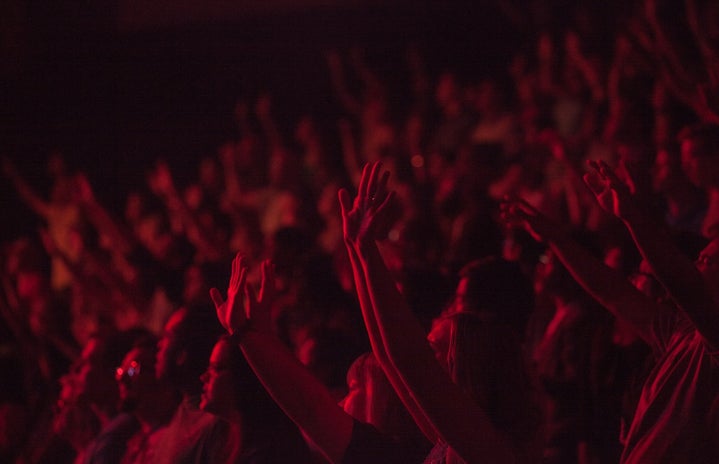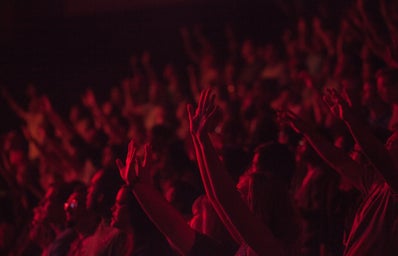Not to sound bitter, but the back end of the COVID pandemic has seen a steady decline in concert etiquette. That’s not to imply that concerts didn’t have their issues before the lockdown—any mass gathering of a human crowd has inevitable drawbacks. But there’s something different about the post-pandemic concert, and I mean that in the least bleak way possible.
Sure, everything that made concerts a magical experience in the past still exists. Those shared moments of hearing music live and being in the same vicinity as your favorite artists will always be something people can bond over. It just concerns me that many modern crowds won’t strike a balance between not moving at all and moving to the point where they become a liability to the people around them.
I’m sure that when I bring up that last point, the first incident that comes to mind is the tragedy at Travis Scott’s Astroworld Festival in November 2021. For context, 300 people were injured and 10 died of compression asphyxia at a music festival founded by rapper Travis Scott. Scott and the event organizers, including Live Nation, were under criminal investigation for these deaths, considering that the number of tickets sold outpaced the size of the venue and that Scott has been known to promote a “rager” attitude at his shows.
Regardless of who is to blame, this tragic crowd crush and its resulting deaths have changed the way that many artists and event organizers prioritize concert safety. And while Scott was wrong to encourage audience members to disregard one another’s safety, the source of this behavior should also be questioned. It causes me to wonder whether the pandemic has impacted the way that people behave at public events. PittNews Opinions Editor Rachel Soloff cites the parasocial relationships that people developed with their favorite artists during the height of lockdown as a contributing factor to this phenomenon.
This phenomenon also bleeds into another branch of concert etiquette, which is the audience’s treatment of the artist. When the rise of social media makes people feel that they need to document every single thing happening in front of them for internet clout, they are more likely to treat artists at concerts as products for their consumption.
One TikTok from artist Clairo’s 2022 tour shows the artist visibly uncomfortable when a fan sexualizes her right after she performs her song “Blouse,” which details her experiences of being objectified. While people have sexualized artists at concerts for decades, you would think that in 2023, people would be more conscientious of how they talk to artists, especially when the songs they perform explicitly express how unsettled they are by this treatment.
In another example of an artist being disrespected, singer/songwriter Mitski expressed during her 2022 tour that she did not like the idea of people seeing her entire performances behind a phone screen. She stated that not only does this discard the connection between the artist and the audience, but it also “makes [her] feel as though those on stage are being taken from and consumed as content.” I read this statement and thought it was a valid point, one to keep in mind when I record a video at a concert. That way, I’m not wasting 100 percent of my experience behind a phone screen and making the artist feel more like a product than a person.
Many people on Twitter did not extend this kind of grace to Mitski.
Some deemed Mitski’s comment as “insensitive,” citing ADHD and depression as a reason to record an entire concert, as these disorders can impact people’s ability to remember fleeting experiences. By this logic, should we record every single good moment in our lives? As someone who has ADHD and understands how recording videos can be helpful, I still think there is nothing sadder than a shared experience as beautiful as a concert being treated as a social media clout point.
This isn’t to say that recording video at a concert entirely takes away the magic of the experience. If you scroll through any of my Instagram posts at concerts, you’ll see some videos there. However, I don’t believe that audience members should record every second of a concert, especially not when the artist has already expressed how uncomfortable this makes them. Recording at a concert is fine until you notice that these videos are disrupting your ability to enjoy the moment and connect to artists.
On that note, why are some people opposed to having fun at an event that they paid to attend? Why is it so hard to just enjoy the music?
I will never forget seeing Gorillaz live in October and my friend and I being among the ten people standing and moving in our section. At a Gorillaz concert. You know, the “Feel Good Inc.” guys? Apparently, their extremely danceable music isn’t enough to get paying concertgoers to just enjoy the show and disregard the miserable strangers who might judge them. This, of course, doesn’t apply to people who have a disability or medical problem that hinders their mobility. This is more of a general concern than anything. It’s odd that bands like Gorillaz, who have attracted fun and respectful audiences in the past, are now contending with people who don’t even care to enjoy the music they paid to hear live.
Maybe this article will come across as a rant disguised as journalism with no substantive solution. Maybe that’s what this is. However, I think that a culture of disrespect towards artists and other audience members warrants some pushback, especially when it puts other lives in danger. If no one says anything, an experience meant for pure musical enjoyment can become a breeding ground for entitlement.
Want to see more HCFSU? Be sure to like us on Facebook and follow us on Instagram, Twitter, TikTok, YouTube and Pinterest!


